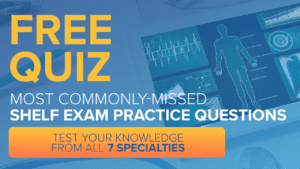Transition from M2 to M3: Learning from Books to Learning from Patients
- by
- May 11, 2023
- Reviewed by: Amy Rontal, MD

When I was preparing for USMLE Step 1, I distinctly remember my anxiety building as the exam approached. This anxiety, though unpleasant, was met and balanced by another powerful emotion: excitement. I was excited by the prospect of finally putting the exam in my rearview mirror, and by the idea that, once it was over with, I’d be in the hospitals, learning from and helping to treat patients. After all, being a doctor is really all about getting to M3, isn’t it? Working with patients is what brought many of us into this field, so it’s certainly exhilarating to finally reach the transition from M2 to M3.
And yet for all the excitement, the transition from school work to clinical practice is not without difficulty. There are definitely some bumps along the way. Here are some changes, pitfalls, and tips to keep in mind as you move from M2 to M3!
Transition From M2 to M3: 4 Changes, 3 Pitfalls, and 2 Tips
4 Changes to Make
1. Time
During M3, most of your time will be spent in a hospital or clinic and in direct contact with patients. There will be an immediate realization that your time is not under your control, and for the most part, it isn’t. As you’ll soon discover, the time requirement itself is much more intensive and much less predictable than during M2. Thus, your study plans and dinner plans will sometimes be in flux. (As a side note: Blueprint’s Cram Fighter is an excellent tool to help structure your study plan and with its rebalancing function, it’s the perfect resource to help you be adaptable.)
2. Grades
As a M3, your clinical rotations are evaluated by shelf exams, and clinical evaluations from your preceptors. You will spend most of your time helping take care of patients and only a minority of your time will be dedicated to practice questions, video lectures, and so on. You will have to take the initiative in your education by learning and participating at the hospital, and also integrate studying that is specific for the upcoming shelf exam. The ‘on-the-job’ learning is absolutely relevant to your growth as a clinician, but it alone is not enough to crush the exams.
3. The Stakes
As an M3, you’re not alone in the hospital and you’re not the sole decision-maker on really any aspect of your patient’s care. The goal is that you get one step closer to being able to make those decisions. As an M2, the worst that could happen is UWorld puts an X on your answer choice. While the stakes as an M3 are shielded by the attending/resident on your care team, they soon won’t be.
I would advise you to take advantage of this time! It’s truly an invaluable learning environment to be able to make your own independent assessment and plan for a patient without putting the patient at risk. You only get so many chances to learn in this environment before a mistake has real consequences. This is a major transition of responsibility during these clinical years.
4. Mental Health
The transition to M3 comes with a set of new and unique stressors. Difficult days become deeper than a poor exam performance or bad block of practice questions. Being involved and moreover, invested, in your patient’s care and their lives is truly rewarding. However, there are times when the outcomes don’t pan out in our favor, and those days can be truly difficult. When they come, talk to someone and debrief about adverse experiences. Whether it’s a peer, a resident, a faculty mentor, or a close friend, remember you’re not alone.
3 Pitfalls to Look Out for
1. Being Present, but not Active
Don’t assume that your presence is enough to learn the information necessary to grow clinically or to pass the shelf exam. You need to be proactive and secure learning opportunities. Some resident physicians and attendings are stellar educators, and some are not.
During M3, I learned a lot about patient care, clinical decision-making, and procedural skills, but even the best educators spent little time teaching information specific to the shelf exam. The assumption from most preceptors was that shelf studying is done on your own time, between clinical obligations, or at home.
Additionally, while some preceptors will put you in the right place at the right time to secure a learning opportunity, not all of them will. If you want to learn more about something, or if you want to help with a procedure, find a time when your team has a moment to relax, and ask.
2. Procrastination
Don’t start your shelf studying on week two, week four, or week eight. Start on day 0. Make a plan, distribute the workload, and execute. If you start halfway through the rotation, you won’t be prepared enough to learn in the clinical setting and participate in your patient’s care, and you’ll have half the time to fine-tune your learning and identify knowledge gaps with residents and attendings nearby.
3. It’s Real Life
Another common pitfall is bringing a preclinical mindset into the hospital. Recognize that learning from patients is very different than learning from a Qbank question or a flashcard. The medical knowledge you have now must be applied to patients. I recommend paying close attention to the orders your residents place, the lines/tubes your patient has, and what other healthcare members are assisting in their care. Being present, engaged, and invested in your patient’s care is the best way to understand and retain information about their medical conditions and management.
2 Tips for Learning in Clinical Scenarios
1. Take Ownership for Your Patients
Be invested and take ownership of the decisions your team makes for your patient. Replace the phrase “The team decided…” with “We decided….” Consider that in a short span of time, you will be in charge and your decision will impact the patient directly. When the team decides to remove the foley catheter, ask yourself, is that a good decision or a bad decision? Why is it a good decision or a bad decision? Why on day one, and why not wait one more day? If you disagree with something or don’t have an opinion, it’s almost always a learning opportunity.
2. Blend Some of Your Studying Together
Much of the learning inside the hospital will feel separate from the studying you do for the shelf exam. However, some of it can be blended. As you are working your way through a rotation textbook, or Qbank questions you will notice concepts like “How to diagnose pneumonia” or “What is the next best step in management for a patient with heart failure?” You will inevitably get the chance to evaluate a patient with a fever and a cough (maybe it’s pneumonia) or to assess a patient with heart failure.
Take those opportunities! Take ownership and come up with your diagnosis and your plan. Regardless of whether you are right, the patient, the clinical context, and the way your team manages the patient will stick with you! Trust me when I say, pneumonia and heart failure are diagnoses to be intimately familiar with for shelf exams and STEP/COMLEX 2.
Put your knowledge to the test with this FREE shelf exam practice quiz of the most commonly missed shelf questions from the Rosh Review Shelf Exam Qbanks (one for each specialty)! How many questions can you get?
Further Reading
Going from M2 to M3 is an exciting moment in the life of a student. But there are some things to look out for when you reach this important milestone. Keep these four changes, three pitfalls, and two tips in mind when you start your clinical work, and you’ll not only get the most you can from this time but be ready to crush the shelf exams as well!
If you’d like to further your knowledge and prep for clinical rotations, here are some extra (free!) resources on the Blueprint blog:
- How to Honor Your Clerkships
- How to Introduce Yourself to Patients During Rotations
- How to Introduce Yourself to Physicians During Rotations
- How to Study For Shelf Exams: A Tutor’s Guide
- Best Shelf Exam Study Resources: A Comparison & Breakdown
- Clerkship Pitfalls: What Is Situational Awareness in Healthcare?
About the Author
I attended Purdue University for undergrad and completed a Bachelor of Science in Chemical Engineering with a Pre-medical focus and then continued my journey to Indiana University for Medical School. I am currently in my fourth and final year of medical school with the intention of pursuing a career in academic general surgery. Over this time, I have worked as a tutor for over 10 years, including several years working as a tutor in the department of engineering and now tutoring medical school exams exclusively with Blueprint. I am currently interested in either vascular or trauma surgery but as I prepare for general surgery residency, I have an open mind. As a fun fact, I have worked as a personal trainer for 5+ years and currently own and operate a personal training business.










